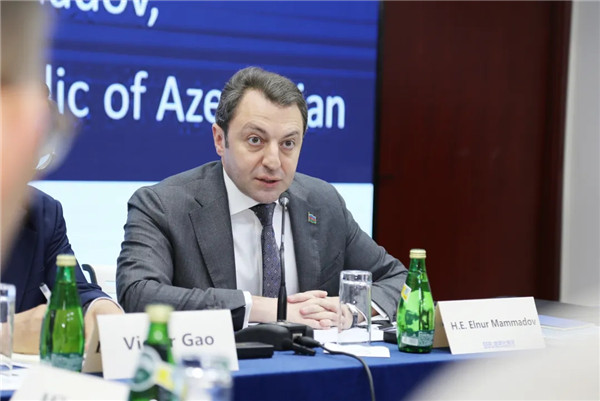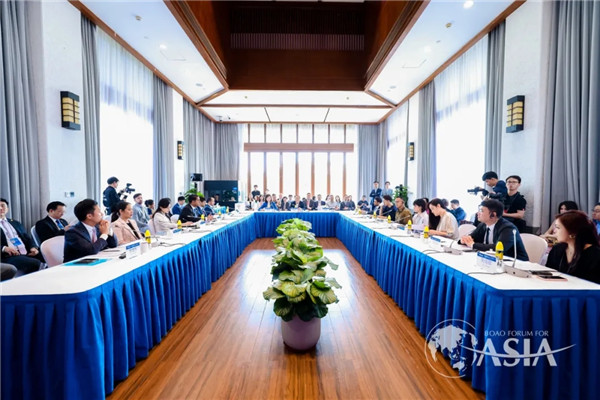【中国日报】Cooperation potential called ’limitless’
2015年3月3日Scholars, government officials and company executives from China and the US got together Feb 26 and put their heads together at a three-day conference on how to better tap into the potential for China-US economic cooperation.
"I haven’t closed my eyes and slept in the past 48 hours due to the long flight and time difference, but I still feel energetic and excited, thinking of the great potential for cooperation between Chinese and US companies," Wang Jian, general manager of the corporate banking unit of Bank of China, told the conference when he arrived in San Francisco from Beijing on Feb 26.
A Chinese delegation, headed by Wang and made up of more than 60 scholars and representatives of small-and medium-sized enterprises (SMEs), came to the Bay Area for the conference "Cracking the US Market: Opportunities & Threats for Chinese Multinationals," which was hosted by University of San Francisco and co-hosted by Bank of China and the city of San Francisco.
Wang said the aim of the conference was to build bridges between Chinese and US companies in order to boost two-way investment and cooperation between the world’s two largest economies.
"China has a vast market and low-cost labor and materials, but its technology remains backward and the pollution issues need to be addressed as well," Wang said. "The potential for China and the US to complement each other’s strengths is beyond measure."
Over the past few years, Wang’s unit has been conducting research on how to better assist Chinese SMEs on entering overseas markets, he said. They also organized a trip for entrepreneurs to visit European companies in 2013.
"We found they are very interested in the foreign companies’ advanced management and the technologies of reducing pollution and energy consumption," he said.
His comments were echoed by California state senator Robert Herzberg, who also attended the conference.
"In the last few years, the number of businesses on the both sides has grown tremendously, particularly the Chinese businesses investing in America and California," said Herzberg, who has traveled extensively throughout China as an international business attorney.
"The real estate purchases in southern California and wineries in northern California," Herzberg said in an interview, "there are a lot of examples of companies working together. I think it’s going to grow and grow quickly."
Thus far, however, there hasn’t been a platform for SMEs from both sides to establish dialogues and the Chinese SMEs have encountered various difficulties in going global, such as lack of information and opportunities, as well as high cost, said Wang Jian.
With the number of Chinese enterprises coming to the US on the rise, their demands on supporting financial services will also increase, such as cross-border financing businesses and international trade settlements, according to Wang Huiyao, a professor attending the conference, who is also the founder and president of a Beijing-based think tank, the Center for China & Globalization.
"Bank of China will play a very important role in helping Chinese SMEs survive and thrive in the US market by bolstering their financial strengths," Wang said.
Hertzberg also pointed out the importance for Chinese businesses entering the US market to better understand things like California’s unionized labor and labor laws.
"China has different kinds of labor laws, so it’s important for the Chinese companies that come here to understand how labor laws work and make sure they do their homework, just like the California companies who want to go to China, really need to understand how to do business in China," he explained.
"Another issue that needs addressing is hacking and technology, and this is going to take longer to actually build relationships, because there are other interests," said Hertzberg.
"But clearly in the real estate area, other manufacturing and the automobile business, there are great opportunities," he added.
Last year, Chinese investments in the US reached $12 billion, topping the $10 billion mark for the second year in a row. In 2013, Chinese annual foreign direct investment (FDI) in the US exceeded the FDI of US companies into China.
"While the upward trend is expected to continue, there are many challenges and barriers," Chinese Consul General in San Francisco Luo Linquan told the conference. He said he hoped the participants would pool together resources to promote greater Chinese investment in the US.
The conference touched upon such topics as innovation and sustainable growth of Chinese enterprises, patterns and trends in Chinese overseas mergers and acquisitions and challenges for incoming Chinese FDI. Business matching meetings were held on the sidelines between Chinese and the US entrepreneurs.






